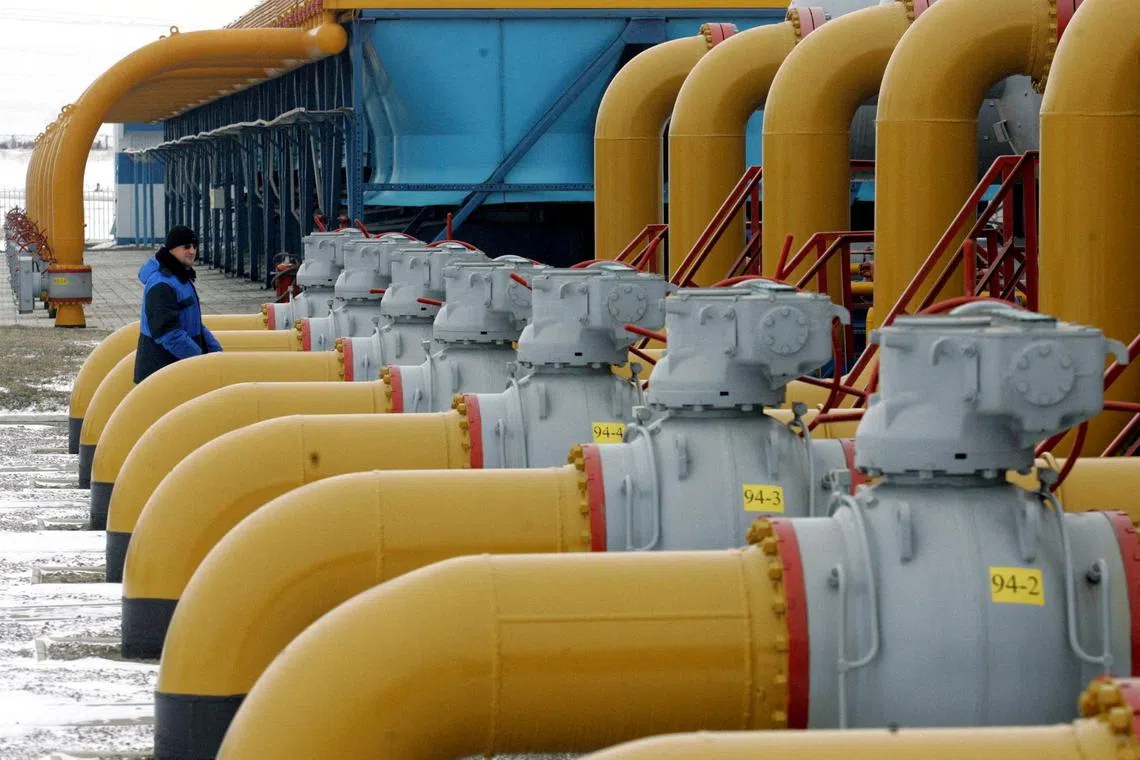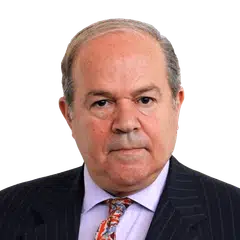News analysis
EU renews Russia sanctions while keeping gas exemptions, as Trump’s Ukraine ceasefire deal looms
Sign up now: Get ST's newsletters delivered to your inbox

Since February 2022, the EU has imposed a total of 15 different packages of sanctions on Russia.
PHOTO: REUTERS
BRUSSELS – The European Union has decided to extend its economic sanctions on Russia for another six months after reaching a last-minute deal with Hungary, which had threatened to veto the measure.
In a communique issued on Jan 28, just days before the sanctions were due to expire, the foreign ministers of the EU’s 27 member states noted that as long as Russia’s military invasion of Ukraine continued, it was “appropriate to maintain in force all the measures imposed by the EU and to take additional measures, if necessary”.
The European Commission, the EU’s executive body, is now urging the continent’s governments to tighten their anti-Russian measures by restricting further imports of Russian minerals and the sale of Western consumer electronics to Russia. However, the EU is still reluctant to ban Russian liquefied natural gas (LNG) purchases, one of Moscow’s most lucrative exports.
And almost three years after their introduction, there are no indications that Europe’s punitive measures have had their desired effect of persuading Russia to halt its war against Ukraine.
Since February 2022, when Russian troops launched a full-scale invasion of Ukraine, the EU has imposed a total of 15 different packages of sanctions on Russia, including restrictions on trade, finance, energy and technology.
The US, Britain and several other nations such as Australia, Canada and Japan have followed with their sanction regimes, essentially mimicking the EU measures, and often coordinated with the Europeans.
The sanctions are unprecedented in both their scope and severity. They include, for instance, freezing the funds of Russia’s national wealth reserves if these were invested in the West and excluding many Russian banks from global pay-settlement platforms and credit card networks.
However, European sanctions need to be renewed every six months.
Long reputed to be Russia-friendly, Hungarian Prime Minister Viktor Orban has often railed against the continuation of the EU sanctions, claiming that they impose an intolerable burden on the Hungarian economy and provide no solution for the carnage in Ukraine.
Mr Orban was determined to veto the latest renewal of sanctions because he was angered by Ukraine’s decision to stop the flow of Russian gas, which was previously pumped to Hungary through a pipeline laid on Ukraine’s territory.
At the start of 2025, Ukrainian President Volodymyr Zelensky shut down the pipeline, insisting he will not let Russia make money while Russian troops are crushing Ukraine; Russia, Mr Zelensky promised Ukrainians, will not be allowed to “earn additional billions on our blood”.
But the pipeline blockage incensed Mr Orban, who claims that his country, which is landlocked, does not have the option of switching to supplies of liquefied gas delivered by tankers from other global producers, and must therefore continue to rely on Russian gas delivered through a pipeline that, given Europe’s borders, has to pass via Ukraine.
This week, the EU overcame Hungary’s threatened veto on the renewal of sanctions by promising the Hungarians that other gas sources would be found.
But what counted most in Mr Orban’s U-turn was the Hungarian leader’s realisation that US President Donald Trump has no immediate plans to roll back American financial restrictions imposed on Moscow.
Mr Orban, who considers himself Mr Trump’s closest European friend, concluded that this was not the moment to break ranks with other Western countries.
Having averted what could have been a major diplomatic crisis, the European Commission has now asked EU member states to approve a new package of sanctions designed to tighten even further the financial screws on Russia.
The EU is proposing a phased ban on European imports of Russian aluminium as well as further restrictions on trade with Russia in software, hardware and other technologies, including consumer products such as video game equipment like Microsoft’s Xbox, which the EU says Russia is using to pilot its military drones.
Scores of foreign companies – including many in China, Turkey and other countries that have helped Moscow evade the EU measures – will also be sanctioned.
However, the latest EU proposals – still circulating between European capitals only in draft form – are considered insufficient by the union’s member states bordering Russia, which feel directly threatened by Moscow’s behaviour and urge harsher sanctions. The vulnerable Baltic nations in northern Europe want the EU to decree a total ban on Russian LNG sales and move instead to purchase US liquefied gas, as Mr Trump is urging.
However, the current EU proposals say nothing about this.
“It is a pity,” Lithuanian Energy Minister Zygimantas Vaiciunas told journalists, once details of the EU’s latest sanctions proposals leaked to the media.
“To a certain extent, we are disappointed,” he added.
Yet by far the most significant problem – and one no European politician is willing to admit – is Russia’s evident ability to defy the sanctions and continue its military operations in Ukraine.
There is no question the Russian economy is suffering. Russia’s war spending now devours a whopping 40 per cent of the country’s annual budget.
As a percentage of its national wealth, the Russians are allocating more than double the amount spent by the US to its military.
The war has created severe labour shortages and massive distortions in the civilian economy, as many Russian men are either in uniform or working for the ballooning arms industries.
Inflation is rising fast; interest rates are now around 21 per cent, punishing economic development and investment.
Still, there is no evidence that the coffers of Russia’s government are running dry.
And despite the war, the Russian economy exceeded nearly all expectations in 2023 by growing around 3.6 per cent, with this momentum continuing into 2024.
Dr Richard Connolly of Oxford Analytica – a British-based consultancy – argues that Russian businesspeople were already accustomed to operating in an often hostile and challenging business environment, so they have found it relatively easy to capitalise on the opportunities created by Western sanctions.
Domestic Russian entrepreneurs rushed to fill the void created by departing Western investors and companies.
“The number of registered private businesses has grown briskly since the war began, reaching a record high in 2024,” said Dr Connolly.
Still, the EU will persist with its sanctions, mainly because it has no other viable options.
Not – that is – until Mr Trump takes centre stage with his promise to negotiate a ceasefire between Russia and Ukraine.
Jonathan Eyal is based in London and writes on global political and security issues.



